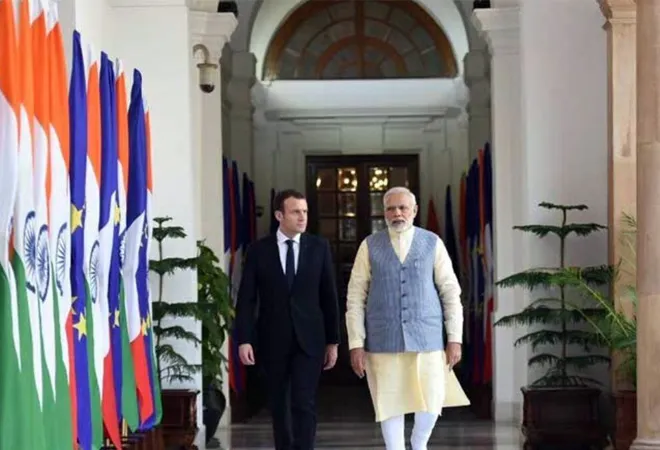-
CENTRES
Progammes & Centres
Location
An announcement meant to create ripples in the Indo-Pacific has created waves across the Atlantic. But this gives France and India an opportunity

Last week witnessed the aukward birth of a new security alliance — AUKUS — bringing together Australia, the United Kingdom (UK) and the United States (US), coupled with a deal involving the US and the UK building eight nuclear attack submarines for Australia. The announcement was guaranteed to create waves in the Indo-Pacific, but the fallout of Australia cancelling the five-year-old deal with France for a dozen diesel-powered attack submarines created bigger waves across the Atlantic.
The objective of AUKUS is “to deal with rapidly evolving threats”, and it envisages closer intelligence-sharing and cooperation in areas of Artificial Intelligence (AI), cyber-warfare and quantum computing. The US, UK and Australia are already part of the Five Eyes intelligence network, together with Canada and New Zealand. And so, up to this point, AUKUS would have been seen as an attempt to shore up an Anglo-Saxon grouping in the Indo-Pacific, attracting dismissive commentary from Beijing and mild speculation about how AUKUS would engage with Quad. However, it is the abrupt cancelling of the submarine deal that has shocked and angered France.
AUKUS would have been seen as an attempt to shore up an Anglo-Saxon grouping in the Indo-Pacific, attracting dismissive commentary from Beijing and mild speculation about how AUKUS would engage with Quad.
There is more than just the 31 billion euros at stake. Both Australia and France saw it then as a long-term investment and the recognition of shared interests in the region. There was indeed some unhappiness about growing costs and time delays. The hard fact is that, in the last five years, Australia’s threat perceptions about China have radically changed. Relations have nosedived, with Australia curbing Chinese influence activities and cutting out Huawei, and China retaliating with significant sanctions on Australian imports.
Yet, the reason that France reacted angrily and foreign minister Jean-Yves Le Drian described it as “a stab in the back” is because Prime Minister (PM) Scott Morrison visited Paris in June. The outcome was a highly publicised vision statement, a long-term strategy for enhancing partnership through the Australia-France Initiative (AFiniti). It was followed by the inaugural session of the 2+2 Strategic Dialogue between the foreign and defence ministers on August 29 and 30. For Le-Drian, it was a blow because he had negotiated and concluded the deal in 2016 as defence minister during the Francois Hollande period.
In 2015, Australia had specifically sought diesel-electric boats. France outbid competition from Germany and Japan with the Barracuda nuclear attack submarine, modified into a conventionally powered Shortfin Barracuda Block 1A design. An unwritten understanding was that, if the nuclear-power option was to be explored, it would be available. Former Australian PM Tony Abbott has been urging a switch since 2017. In 2016, Australia concluded that the US would not share nuclear propulsion technology. The US has shared it only with the UK, but that relationship is different as the US even supplies the UK with Trident submarine-launched ballistic missiles (SLBMs).
Relations have nosedived, with Australia curbing Chinese influence activities and cutting out Huawei, and China retaliating with significant sanctions on Australian imports.
In a biting comment about the US, Le Drian complained that “this brutal, unilateral and unpredictable decision looks very much like what Mr
The reactions in the region have been along predictable lines. China has called it “irresponsible” and warned that it can “exacerbate an arms race”. Japan and Taiwan have welcomed the submarine deal while South Korea has been muted. Indonesia and Malaysia have voiced concerns.
With the Quad summit taking place in Washington, foreign secretary Harsh Vardhan Shringla distanced Quad — “a plurilateral grouping of four countries that have a shared vision of their attributes and values” — from AUKUS — “a security alliance between three countries”, adding that “from our perspective, it is neither relevant to the Quad nor will it have any impact on its functioning”.
Following a telephone conversation between Joe Biden and Emmanuel Macron, both sides have tried to put a lid on the issue. The leaders will meet next month and the French ambassador will return to Washington.
Foreign secretary Harsh Vardhan Shringla distanced Quad — “a plurilateral grouping of four countries that have a shared vision of their attributes and values” — from AUKUS — “a security alliance between three countries”, adding that “from our perspective, it is neither relevant to the Quad nor will it have any impact on its functioning”.
However, the French will recalibrate their ties with the Anglosphere. Unlike the UK, France has always seen itself as an independent global player and preferred greater autonomy while being pragmatic about the US lead. This attribute has been a key factor underlying its close strategic partnership with India that dates back to 1998.
India’s nuclear submarine programme (ATV) began in the 1980s, but progress has been slow. That is why India has been leasing Russian nuclear attack submarines (INS Chakra I and II) since the 1980s, and Chakra III is due in 2025. India’s programme switched after 1998 to the ballistic missile submarine (SSBN) class with Arihant deployed, and Arighat now undergoing trials. It will move in tandem with the development of longer-range SLBMs, K-5 and K-6 with a 5,000 km and 6,000 km range respectively.
India’s programme switched after 1998 to the ballistic missile submarine (SSBN) class with Arihant deployed, and Arighat now undergoing trials.
The shortfall is in achieving the target of 24 submarines, 18 diesel-electric and six nuclear-powered, originally set out in 1999. Six conventional boats are being built under Project 75; six more conventional vessels were cleared by Cabinet Committee on Security (CCS) earlier this year under Project 75 I with deployments scheduled for the 2030s.
The Navy has agreed to give up the third aircraft carrier to fast-track the six nuclear attack submarines project. Now that the US has breached the taboo regarding nuclear propulsion and cleared the way, the time has come for India and France to set a new milestone for strengthening their strategic partnership. As French strategist Bruno Tertrais explained, “Trump didn’t care about allies; Biden does, but perhaps not all of them equally”.
This commentary originally appeared in Hindustan Times.
The views expressed above belong to the author(s). ORF research and analyses now available on Telegram! Click here to access our curated content — blogs, longforms and interviews.

Ambassador Rakesh Sood was a Distinguished Fellow at ORF. He has over 38 years of experience in the field of foreign affairs economic diplomacy and ...
Read More +